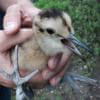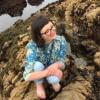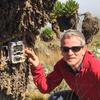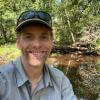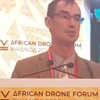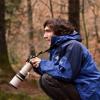Sensors already equip a range of tools to enhance monitoring capacity for conservation. Some of the higher bandwidth technologies, like camera traps and acoustic monitoring systems, have been essential elements of the conservation toolkit for decades, and thus have enough users that we've created dedicated WILDLABS groups to address them. But a whole range of lower bandwidth sensors beyond these core technologies are being increasingly integrated into conservation monitoring systems, and offer rich new insights into the wildlife and ecosystems we're all working to protect. As with many technologies, cost and access have historically been challenges to the adoption of new sensors, but with low-cost and open-source solutions on the rise, we're excited to see what the future of this space holds.
Getting Started with Sensors:
- Watch Shah Selbe's Tech Tutors episode on scaling FieldKit, an open-source conservation sensor toolbox, from a project to a successful conservation tech product.
- Check out our Virtual Meetup about Low-Cost, Open-Source Solutions in conservation tech, including a talk by Alasdair Davies on the Arribada Initiative's work with thermal sensors in early warning systems.
- For a more in-depth introduction, watch the first video in our datalogger mini-series: Freaklabs: How do I get started with Arduino?
In this group, you'll meet others who are using and innovating diverse sensors in their work, discuss ways to make sensors more effective & accessible for conservationists, learn about what sensors are already helping us accomplish in the field, and have the opportunity to ask and answer questions. Join this group to get started!
Header image: Emma Vogel, University of Tromsø
No showcases have been added to this group yet.



- 1 Resources
- 12 Discussions
- 8 Groups
Ph.D Speech-Hearing Sciences; 3D Designer/Printer interested in building/testing/deploying standardized environmental recording platforms for scientists and engineers in developing countries.
- 0 Resources
- 0 Discussions
- 10 Groups
- @IsobelAshbey
- | She/her/hers
Running a Tech for Good initiative at Cambridge Consultants, looking for organisations who need help developing new technology for conservation


- 1 Resources
- 8 Discussions
- 5 Groups
Dr JOhn Read is founder and CEO of Conservation Innovation company Thylation, and founder and director of several adaptive management conservation projects . www.ecologicalhorizons.com, www.thylation.com, www.johnlread.com
- 0 Resources
- 0 Discussions
- 4 Groups
Royal Society for the Protection of Birds (RSPB)
A technologist and a conservationist



- 0 Resources
- 24 Discussions
- 5 Groups
- 0 Resources
- 0 Discussions
- 3 Groups
Wildlife Conservation Society (WCS)


- 1 Resources
- 0 Discussions
- 6 Groups
Prof at NC State University and Scientist at NC Museum of Natural Sciences



- 1 Resources
- 19 Discussions
- 3 Groups
- 1 Resources
- 2 Discussions
- 1 Groups
Smart Parks
Founder of Smart Parks - www.smartparks.org / Founder of OpenCollar - https://opencollar.io



- 0 Resources
- 17 Discussions
- 5 Groups

- 0 Resources
- 2 Discussions
- 6 Groups
Technologist, birder, photographer and mountain guide.
- 0 Resources
- 0 Discussions
- 18 Groups
In our new From the Field series, we're speaking with WILDLABS members to discover how they use technology in their work. Through these interviews we will be showcasing the variety of technologies our members are...
22 March 2017
Are you ready for this year's #Tech4Wildlife Photo Challenge? In anticipation, we're counting down our ten favourite entries from last year. Do you think you can top these?
1 March 2017
There’s no doubt about it. Bees are an important and integral part of our ecosystem, and their role as pollinators an incredibly important one. If you’re a fan of the popular TV drama series Doctor Who, you may be...
20 December 2016
The Conservation Leadership Programme (CLP) is a training and capacity building programme that targets individuals from developing countries who are early in their conservation career and demonstrate leadership...
21 November 2016
Technology by itself will not save pangolins or elephants, but it can help make major progress.
14 November 2016
Do you work on conserving Neotropical migratory birds? Do you need funding? Why not apply for a grant from the U.S. Fish and Wildlife Service through the Neotropical Migratory Bird Conservation Act's grant program? The...
8 November 2016
As a visiting research scholar with UNODC, Isla Duporge asked wildlife crime experts about their experiences using remote sensing technologies to combat illicit wildlife and forest activities. In this article, Isla...
7 November 2016
Seabirds are killed in longline fisheries at such a fast rate that albatrosses cannot breed fast enough to rebuild populations. Solutions exist to prevent this “bycatch”; current best practice recommends fishing...
5 August 2016
Caves don't tend to be well-liked ecosystems, being extremely dark, often quite cramped, and slippery. And the creepy-crawlies that live within them can be the stuff of nightmares. Nevertheless, one's attitude towards...
25 July 2016
More than half of all primate species are endangered, including our closest living relative, the chimpanzee. Could Passive Acoustic Monitoring (PAM) be applied to primates as well as it has been for other taxa? In this...
29 June 2016
How do new colonies come about? And why do we observe young colonies to grow much more rapidly than their own production of chicks would allow them to? As Jana W. E. Jeglinski explains, cutting edge developments of...
25 April 2016
The Captain Planet Foundation is offering EcoTech grants in the amount of $2,500 to engage children in inquiry-based project in STEM fields.
18 February 2016
August 2025
event
September 2025
event
March 2026
June 2023
event
May 2023
event
17 Products
Recently updated products
121 Products
3 R&D Projects
84 Organisations
Recently updated products
Recently updated R&D Projects
Recently updated organisations
| Description | Activity | Replies | Groups | Updated |
|---|---|---|---|---|
| That's great Jason. I think your approach can be very successful. I'm a little bit familiar with Wild Book through my contacts at IBEIS, who I believe you... |
|
Sensors | 9 years 5 months ago | |
| I was amused to read about a flock of pigeons just released in London to tackle pollution. The flock was equipped with pollution... |
|
Sensors | 9 years 5 months ago |




